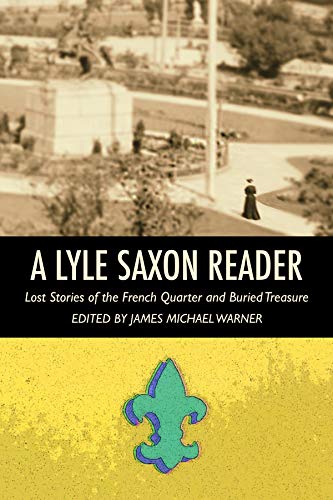A Lyle Saxon Reader: Lost Stories of the French Quarter and Buried Treasure. It received a 4+ star review, making it an IndieReader Approved title.
Following find an interview with author Mike Warner.
What is the name of the book and when was it published?
A Lyle Saxon Reader: Lost Stories of the French Quarter and Buried Treasure. It was released on September 28, 2018.
What’s the book’s first line?
Lately the newspapers have been full of stories of buried treasure, Spanish doubloons, pieces of eight. And once, again, I have delved into a long-locked chest and have taken out the map of that treasure island in the Caribbean Sea.
What’s the book about? Give us the “pitch”.
A Lyle Saxon Reader contains more than three dozen stories by the New Orleans author Lyle Saxon. Even his most ardent fans have read few of these works.
During the first half of the twentieth century, Saxon wrote several books about Louisiana and its history, earning him the sobriquets, “Mr. New Orleans” and “Historian Laureate of the City.” Some of his best-known titles include, Fabulous New Orleans, Old Louisiana and Gumbo Ya-Ya.
For this book, I collected and edited thirty-nine stories first published during Saxon’s early career as a reporter for the New Orleans Times-Picayune. Most of these writings, drawn from the years 1919 through 1923, have been out of print since their original publication.
Therefore, the majority of the works in this anthology have not been widely seen for almost a century. Even readers who are familiar with Saxon will find a lot here that is new.
What inspired you to write the book? A particular person? An event?
I am working on a biography of Charles Whitfield Richards (1906-1992), a newspaperman and artist who was active throughout the South and the East coast. While putting that work together, I came to appreciate Saxon’s writings and the role he played in New Orleans history and architectural preservation. Richards and Saxon shared a lot of interests and colleagues, so the idea for A Lyle Saxon Reader flowed naturally from the Richards biography. Studying Saxon’s background, I realized that his earliest published works had disappeared from public view. It made sense to collect and edit this anthology.
What’s the main reason someone should really read this book?
This is the first publication of fresh works by Lyle Saxon since shortly after World War II. If a reader has an interest in Saxon’s works or in the history of New Orleans, this is a great way to learn more.
What’s the most distinctive thing about the main character? Who-real or fictional-would you say the character reminds you of?
The collection in A Lyle Saxon Reader includes several short works of fiction. My favorite is, “Who Would Hunt for Spanish Doubloons and Pieces of Eight?” In it, Saxon tells of discovering a dying man on a barrier island off the coast of Pensacola, Florida. Before death, the man shares a story of finding buried Spanish gold. All the reader has to do is decode the man’s diary and cryptic treasure map. The main character in this story is apparently Saxon himself, and the setting is based on a job he once had. Whenever I read this story, my mind’s eye sees Indiana Jones.
If they made your book into a movie, who would you like to see play the main character(s)?
If the short story, “Who Would Hunt for Spanish Doubloons and Pieces of Eight?” makes me see Indiana Jones, then obviously the actor would be Harrison Ford. But I think Benedict Cumberbatch would do well also.
When did you first decide to become an author?
While in college, I was editor for the school newspaper and became interested in writing at that time. I told a friend that someday I wanted to write a book. He responded, “You??” In that moment, I set a goal to do it.
What do you do for work when you’re not writing?
In my day job, I’m an attorney for a biotech startup in Silicon Valley.
How much time do you generally spend on your writing?
When I’m in writing mode, I normally spend four to five hours a day writing. But it varies. I’ve found that I can’t be an effective writer and publisher at the same time. When I’m working on putting the books together for publication, I get very little writing done, except for blog posts.
What’s the best and the hardest part of being an indie?
Well, um, strictly speaking, I’m not self-publishing. The author of the works in A Lyle Saxon Reader is a dead guy. He’s had dead guy status for seventy-two years. But that aside, the hardest part about publishing this book has been building a platform. When I started a blog, all I heard at first was the chirping of crickets. It took time, patience and a lot of work for traffic to arrive. I often wondered why I was doing the work if nobody was reading it. But now it is turning around.
What’s a great piece of advice that you can share with fellow indie authors?
Be patient and enjoy it for the sake of what you’re doing. It’s a lot more work to publish than you can imagine at the beginning. And there’s a significant risk that you won’t make your cash investment back.
Would you go traditional if a publisher came calling? If so, why?
Likely, I would. It would change little of what I’d do in terms of marketing, platform and publicity. But it would take away a lot of the work of publishing.
Is there something in particular that motivates you?
I would really get a kick out of a scene in which one of my books goes out of print and a few years later, I find that Abebooks.com has an old copy at $100.
Which writer, living or dead, do you most admire?
I’ve been reading a lot of Hemingway and find him a fascinating character. It’s hard to say that I admire him, because he was cruel to a lot of people—especially women. But most of his writings are wonderfully crafted. Someone whom I do admire is Madeline Miller, author of Circe. Her knowledge of Greek mythology is astounding, and she weaves an engrossing story.
Which book do you wish you could have written?
It’s a silly little book, but I wish I could have written Sherwood Anderson and Other Famous Creoles, by William Faulkner and William Spratling. The book was written and drawn at a fascinating time in New Orleans history and contains capsule descriptions of many of that city’s key characters.


